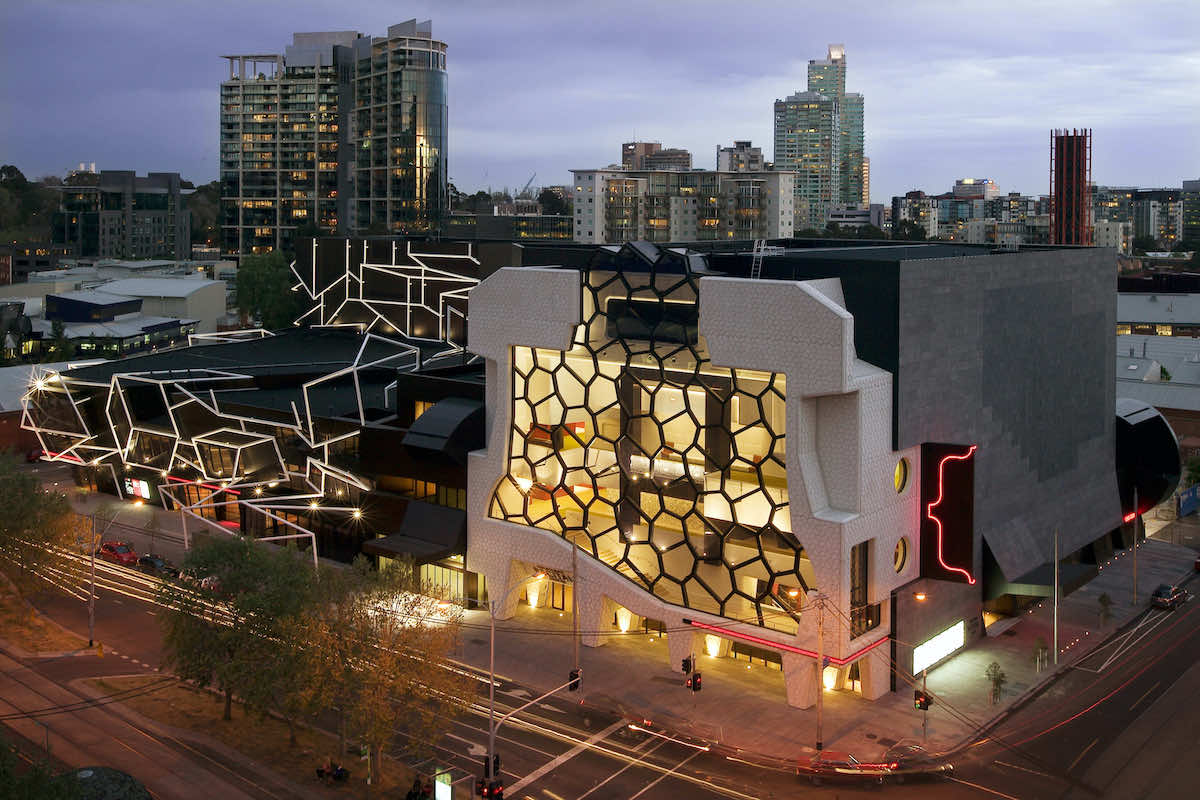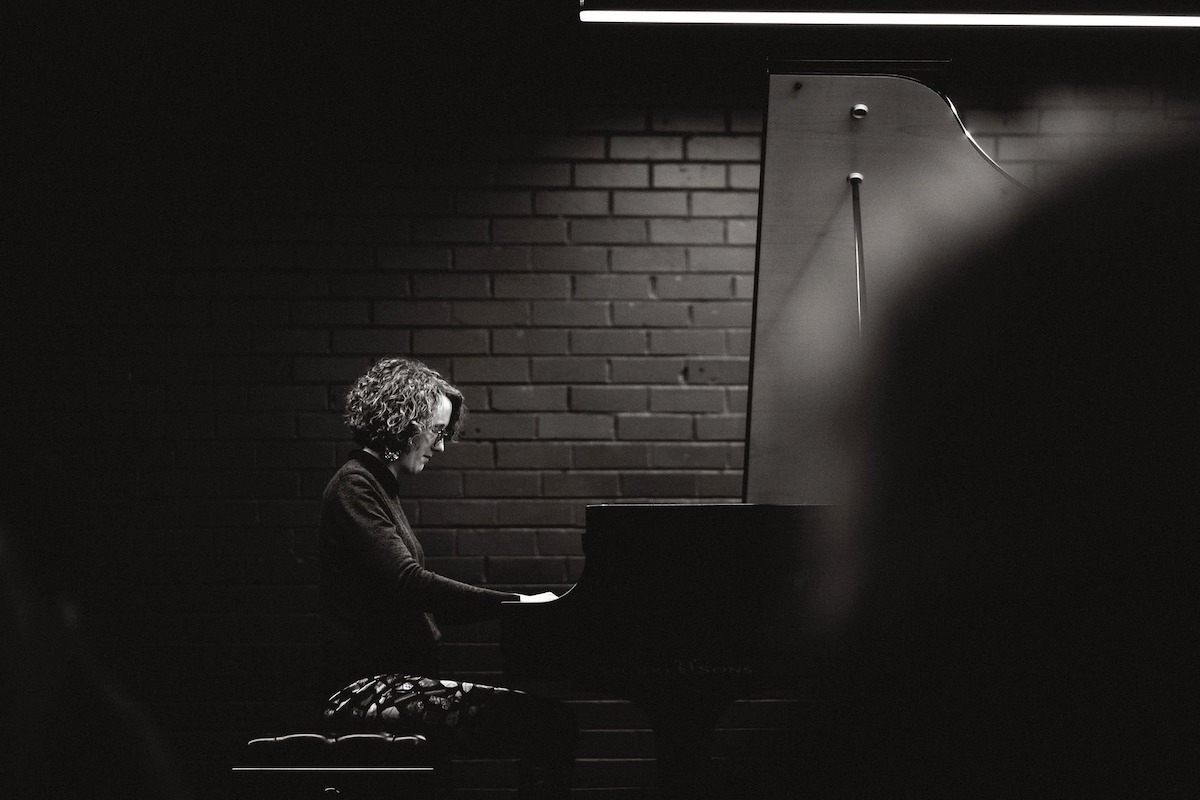The Primrose Potter Salon is a performance room that’s part of the larger complex of venues at the Melbourne Recital Centre.
It’s a lovely place, with a beautiful grand piano and excellent ambience. Named after Lady Primrose, a 92-year-old philanthropist and arts administrator best known for her support of The Australian Ballet, the salon offers “emerging and upcoming artists” the chance to play in an intimate and warm environment.

Melbourne Recital Centre. Photo supplied
Since the MRC opened in 2009, the Salon has hosted many diverse and wonderful artists. Generally speaking, however, those who attend these cosy events tend to be less varied in appearance. Typically able-bodied, white and middle-class, they embody the characteristics of Melbourne’s privileged arts-going audience.
Nat Bartsch’s recent show (19 March) at the Salon was a different story.
Part of the MRC’s Relaxed Performance Series, it was held at noon and designed to cater for school groups, including but not only, schools for people with disabilities. Bartsch says these performances are open to anyone, including to those “who might just find it easier to come to a concert in the middle of the day”, or who might appreciate knowing they will be able to leave the room should they need to.

Nat Bartsch. Photo supplied
Bartsch, 40, was diagnosed as having autism and ADHD in her mid-thirties. She says the diagnosis was a relief and enabled her to understand “why life could be so hard” even when things were going well. Having spent years being misdiagnosed with a range of mental health conditions, she finally understood her experiences in a new light.
She has observed other attempts to accommodate the needs of neurodivergent people at events and believes they can be “tokenistic”. In contrast, she says the MRC’s program of relaxed performances is a carefully curated one that has been “built from the ground up”. Rather than making a few concessions for those with disabilities, the program has been designed for and in consultation with them.
For instance, prior to a relaxed event, the Recital Centre emails a Social Script to those attending. Detailing everything from the transport options to the sounds likely to be heard in the “carpeted foyer”, the script described Bartsch as playing “genre-bending kind music”.
An apt summary. Trained in both tertiary-level classical and jazz, Bartsch is one of a rare group of musicians to have been nominated in both jazz and classical ARIA categories. Her beautiful piano playing shimmers with a joyfulness that she also conveys in person. Her answers to the questions the school students asked at the end of the session were thoughtful, gentle and kind. Already humbled as I watched the disability workers patiently support those in their care, that feeling became very big as Bartsch played her gentle, spacious music with a quiet respect for her audience.
Perhaps best known for her lullaby album, Forever and No Time at All, Bartsch is the 2024 Melbourne Recital Centre Artist in Residence. In this role, she will play a number of events this year.
Bartsch says the program was organised after she proposed a bunch of “crazy ideas” to the staff at MRC. Demonstrating her versatility across genres, including in collaborations with other contemporary and jazz artists, some of these will be performed to the Salon’s usual crowd. But Bartsch says it is her intention to cater to a specific audience – in this case, neurodivergent folk – and hopes others like it, too.
This is the approach Bartsch took with Forever and No Time at All. Written in the early months of her son’s life, the album was designed to soothe babies while also calming their parents who might “prefer not to listen to Twinkle Twinkle over and over”. The album has reached a far larger audience.

Nat Bartsche. Photo supplied
Bartsch’s music is described on the MRC website as being “played by people from all walks of life, often in profoundly personal moments – from the birthing suite to the final hours before death”. I can testify to this. Having raised their children on her beautiful neoclassical piano playing, friends now take their young adult children to see her at the Jazzlab in the Melbourne suburb of Brunswick.
One of the songs Bartsch played at the relaxed performance was called Breanna. It’s about a neurodivergent actor of that name who works with the award-winning Geelong-based company, Back to Back Theatre. Bartsch described this as “a fast-paced, happy song”. Celebrating her own adult diagnosis of autism and ADHD and sharing this with the audience, Bartsch declared her neurodivergence to be her ‘superpower’.
Questioned by a young women in the audience about what inspired her music, Bartsch said she drew on very personal experiences – such as her relationship with her son or her response to the 2020 fires – while also trying to communicate something universal. Her embrace of neurodiversity is similarly both a social and a musical project.
I took several CDs into the birthing suite when I went all those years ago, including Keith Jarrett’s The Melody at Night with You. That album still makes me cry, though I don’t think Jarrett is a very likeable man.
In contrast, Bartsch’s music seems to match her way of being in the world. Honouring and encapsulating a growing community of Melbourne musicians who are as committed to honouring mutual care and respect as to making wonderful music, she is determined to draw as many as possible into the good fortune that the residency offers.
As part of the program, she will host the first of several gatherings for neurodivergent musicians in the MRC foyer, with the aim being to make “a social event for people who don’t like socialising”. It is a worthy ambition to calm and help others from an award-winning composer and musician whose quietly growing success is easy to celebrate.
Visit this link for upcoming events in Melbourne Recital Centre’s Relaxed Performances series.











Comments
Log in to join the conversation.